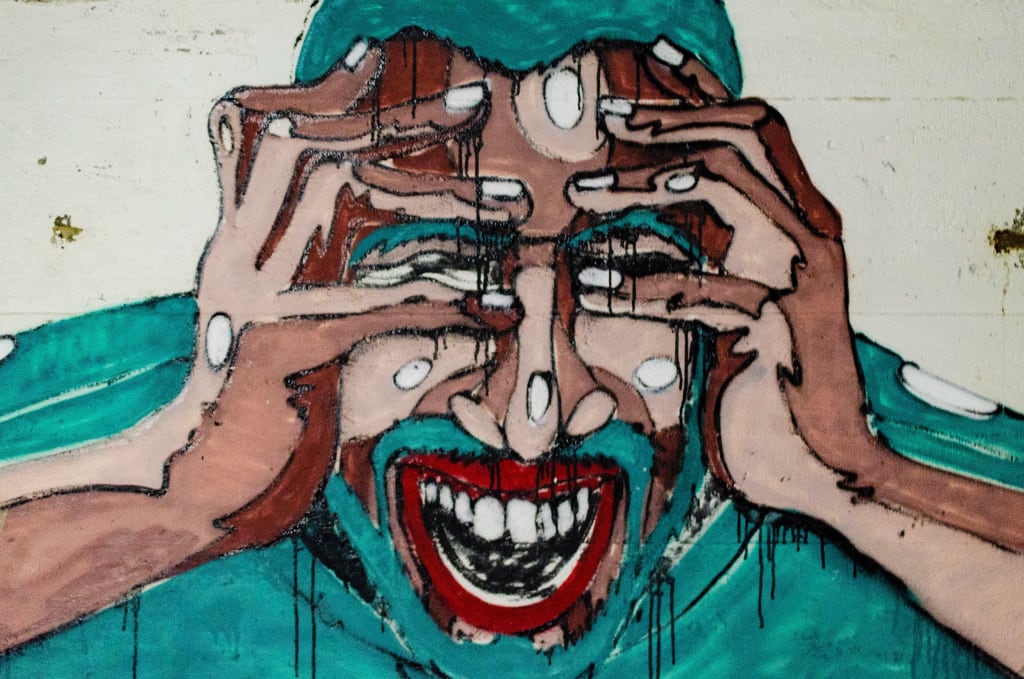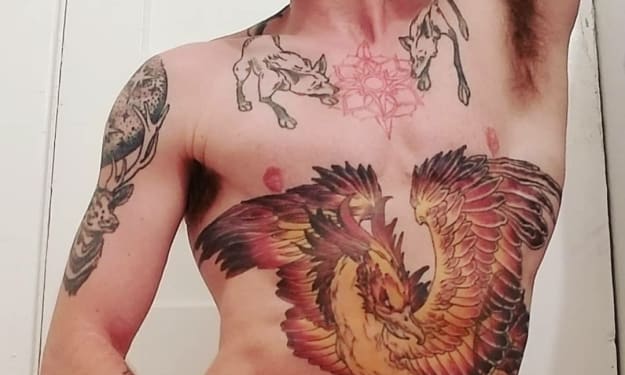PTSD, inconvenient anger, and the power of forgiveness
A personal journey into the ins and outs of life with difficult emotions

When something traumatic happens to you, oftentimes during the recovery process you will come against something known as "toxic positivity culture". In short, this can be described as swallowing or denying an emotion, thought process, or way of coping in order to say everything is okay and nothing "bad" has tainted your head space. When I was younger, I found myself submerged in the counterculture of Vancouver's Commercial Drive. White women with dreadlocks and crystal collections that could pay off my student loans would tell me about the inner workings of the universe, how it was all connected, and the magic of sacred geometry. “What exactly is sacred geometry?” I would ask. “Like, what applications does it have?” The only reply I would get was, “It’s in everything, look around you!” I would nod uneasily, feeling like the answer was perhaps lacking some detail. They would educate me on how to set my vibration so that only good things would happen to me and I was swept up in the ideas that focusing on or even acknowledging my anger, sadness, frustration, disappointment or anything that wasn’t a constant manic joy would result in me allowing these negative energies to taint me; which would often imply I was somehow not a good person. “Low vibrational”, I would hear in very self assured tones.
As I grew and made new friends in new scenes, I began to hear that same judgement in different words. It wasn’t always as obvious anymore, but it was there. I can remember distinctly a young man I met through the queer scene. I was excited to have a new guy friend to goof off with and talk about our niche shared interests, and for a while we shared a glowing friendship full of laughter and deep conversation. Through our talks, he conveyed to me that he felt that anger was something only toxic men experienced, that anger was a sign of an inferior man who hadn’t worked on himself. I nodded along, still sussing out my views on emotions as someone already living with severe PTSD. I was angry. I was angry at the people who had committed violent acts towards me. I was angry at the people who stood by and did nothing. I was angry at all the people who violated my boundaries. Was I a bad man? I wrestled with these feelings while also wrestling with the sentient python that was my trauma. I was always on edge, hypervigilant for danger. I barely slept, and had spent several years drinking in excess to cope. I was in fight or flight all the time. The stigma of these feelings led to a fissure forming within myself. On the one side I knew what had happened to me was wrong, and while there was some doubt over how much of it had been my own fault I knew enough to know it shouldn’t have happened. On the other side, I was angry and grieving, emotions that I wasn’t sure what to do with much like my new friend. We couldn’t talk about these emotions in a constructive way, so ultimately we stopped talking.
Through the years I built a strong outer layer, finding serenity in letting go of things before I had a chance to let them get to me. Thinking of myself like a gay Big Lebowski, I sauntered through life with a devil may care attitude superimposed over what was clearly a neurotic and anxious person. My words said, “It’s all good, I’m just going with the flow”, but my body said, “I need pills to sleep and can’t manage work AND feeding myself.” I struggled to figure out how to show someone what was under that delicate, high maintenance exterior. How could I explain what was going on without first admitting I had broken a cardinal sin by allowing myself to be hurt in the first place? I walked the tightrope of wounded and atrophied feelings, trying to find ways to actually heal. On the occasions I would open the lid to my personal Pandora’s Box, bringing the unsightly mess inside into the light, I would hear other’s urge me to forgive my abusers and just let it go. If I could just get over it and forgive them I would feel better.
I would scoff, how could I forgive my assailants? I was quite young when the abuse that left me with trauma began. That child didn’t deserve that. I didn’t deserve that. As I grew older, new, more violent trauma was layered on top of my childhood trauma, creating the delicious shit trifle that is my mental health. I would dig through one layer thinking, “This is it! I’ve had my breakthrough!”, only to find there was another layer of trauma I had forgotten underneath. It was inescapable, and I didn't ask for it. Forgiveness? That would be letting them get away with it. Forgiveness would only allow it to happen again.
The suggestions poured in: Do a cord cutting ceremony! It’s super easy and it’ll fix it once and for all. Imagine all your pain, and visualize putting it into a bottle and sending it out to sea! Just journal about it! Suggestions given with a warm smile, chins lifted high. People who were happy to impart wisdom and healing on the world around them. In all this advice giving, rarely was I ever asked if I wanted to talk about what happened. Nobody wanted to actually witness my feelings, see their inky blackness ooze from my mouth. They just wanted them to be gone. And so continued a pattern I had been experiencing my whole life, where at the first sign that life wasn’t some ecstatic dance people shoved their heads in the sand.
I wouldn’t reexamine my feelings on forgiveness again until I more seriously immersed myself in Buddhism. I clung to meditation like it would cure me of my PTSD entirely. Like all new things that feel good, it became obsessive at first. For months I always had an audiobook by some wise monk or spiritually enlightened individual streaming through my ears. Thich Naht Hanh, Pema Chodron, Ram Dass, if it was written or recorded I lunged for it like a starving animal seeing food for the first time in a week. During this time I used meditation as a shield to protect me from the outside world, if I just cleared my mind I wouldn’t have to face the events I was so desperately avoiding. It didn’t take long for me to see the flaws in my logic. If you practice anything long enough you will get good at it, and practicing meditation led to the sudden but very obvious epiphany that truly calming your mind means having a radical acceptance of the here and now, even if in the here and now you are afraid and hurting.
For the first time, in the quiet space of my practice, I could stop running. The waves of memories and feelings washed over me, and surprisingly I wasn’t swept away in the undertow like I always subconsciously assumed would happen. Radical acceptance of myself, a young guy who quite frankly has been through a lot, was a very humbling experience. From this standpoint I could finally forgive myself for being angry and miserable. Of course I would be, like so many others living with PTSD years of my life had been spent fighting to live to see another day. For the first time in my life I wasn’t afraid to admit how I felt without shame, there was nothing to judge anymore. Emotions weren’t a part of my core identity, and neither was PTSD. They were just things I would experience temporarily, and when I sat with them without judging them one way or another they became more bearable.
Forgiving myself for being a living breathing creature was fundamental in improving my condition. This is an ongoing process however, constant reminders, check ins, steps forward, steps backward, and steps sideways. I wish I could tell you meditation and reading a bunch of books would “cure” you, that everyone can find peace in the words of an enlightened master. It’s not that simple, healing from trauma is a long and winding road. But these days I find I’m walking along it rather than sitting in a ditch, unable to carry on. In learning to forgive myself I stopped continuing the work of my assailants in hurting me and became my own ally.





Comments
There are no comments for this story
Be the first to respond and start the conversation.